![]()
![]()
![]()
Use LEFT and RIGHT arrow keys to navigate between flashcards;
Use UP and DOWN arrow keys to flip the card;
H to show hint;
A reads text to speech;
214 Cards in this Set
- Front
- Back
|
English Colonies in America |
-Colonized the East Coast of North America -North was settler colonies -South was plantation -South Carolina, New York, and North Carolina |
|
|
French Colonies in America |
-Colonized the middle of the United States ~Set up Trading-Post Colonies -Traded fur with the Native Americans |
|
|
Spanish Colonies in America |
-Colonized Florida, Mexico, Texas, bottom of California, Arizona, New Mexico -Set up mainly plantation colonies -Used natives as first slaves -Main cash crop: sugar cane |
|
|
Spanish Colonies in America |
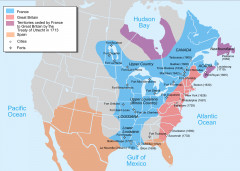
|
|
|
Export |
-Sending goods out -Selling goods -Export than you import -Ex=out |
|
|
Import |
-Bringing goods in -Buying goods -Export more than you import |
|
|
Capitalism |
-An economic system ($$) -Based on private ownership of a business in order to make a profit -Capitalism = Compete Private |
|
|
Limited Government |
-The GOVERNMENT has limits on what it can and cannot do -The people have rights -Types of Limited: -Democracy(US) |
|
|
Unlimited Government |
-The GOVERNMENT is not limited to what they can do (government can do whatever they want) -People have no rights -Un=not ~Types of Unlimited: -Dictator (Hitler) |
|
|
William III and Mary II |
-Signed the English Bill of Rights -Made England have a limited government |
|
|
Magna Carta |
-Signed by King John -First try to limit the king's power -Did not work |
|
|
English Bill of Rights |
-Signed by William and Mary -Limited the government in England |
|
|
Separation of Powers |
-Limited the government by creating different branches of government -Legislative, Executive, Judicial -Baron de Montesquieu |
|
|
Totalitarian Government |
-A type of Unlimited Government where one person is in "total" control |
|
|
Democracy |
-A type of limited government where people have a say in decisions like voting -Demo=people |
|
|
Authoritarian |
-A type of limited government where one person or a small group in charge of the government |
|
|
Geocentric Theory |
-Is a theory that everything revolves around Earth (Earth is in the center) -Geo=Earth -Ptolemy believed this |
|
|
Heliocentric Theory |
-Is a theory that everything revolves around the Sun (Sun is in the center) -Helio=Sun -Nicholas Copernicus believed it -Galileo proved it |
|
|
Ptolemy |
-Believed the Geocentric Theory (Earth is in center) |
|
|
Nicholas Copernicus |
-Believed the Heliocentric Theory (Sun is in center) |
|
|
Galileo Galilei |
-Proved the Heliocentric Theory (Sun is in center) |
|
|
Isaac Newton |
-Created the Laws of Motion -Created the Laws of Gravity |
|
|
Rene Descartes |
-Helped Bacon create the Scientific Method |
|
|
Francis Bacon |
-Helped Descartes create the Scientific Method |
|
|
The Social Contract Theory |
-The idea that government was created as an agreement (contract) between people as an organization to benefit each other |
|
|
John Locke |
-Believed the government's job was to protect people's rights, if the government didn't the people could create a new government(Civil War) -Believed in Natural Rights |
|
|
Jean-Jacques Rousseau |
-Agreed with John Locke -Government's job is to protect the "general will" (majority rules) |
|
|
Baron de Montesquieu |
-Separation of Powers -3 branches of government |
|
|
Voltaire |
-Civil Liberties -Freedom of Speech and Religion -Real name is Francois-Marie Arouet |
|
|
Popular Sovereignty |
-States that governments get their power and authority based on what the citizens want (Gov gets power based on what people want) -Locke and Rousseau believed in this |
|
|
English Civil War |
-Started because King Charles arrested members of Parliament and the people saw it as an attack on them -Royalist (King Charles) vs. New Model Army (Oliver Cromwell) -Result was Limited Gov. |
|
|
King Charles I |
-King of England during the English Civil War -Ignored the Parliament and did whatever he wanted to do -Arrested members of Parliament and started a civil war -Army called Royalist -Escaped England twice -Was beheaded |
|
|
Oliver Cromwell |
-Was the leader of the New Model Army during the English Civil War -After Charles I was killed he became "Lord Protector" of England |
|
|
Constitution |
-Is going to tell you what the government can and can't do *Does NOT mean your government is limited -Can written/unwritten and positive/negative |
|
|
Written Constitution |
-Clearly states the rules and principles on which a nation is run (its "written" out) -Most countries have this ~Example: U.S. Constitution |
|
|
Unwritten Constitution |
-Is a collection of laws, traditions, and court decisions that develop over time, and that's how a government is run |
|
|
Purposes of A Constitution |
-States ideas shared by the people -Establishes a basic structure for the government -Defines the government's powers and duties -Provides the supreme law for a country |
|
|
Positive Constitution |
-Is a constitution that centers on the roles and responsibilities that a government is to carry out ~Example: -Positive: Everyone will given an education -Negative: The government cannot limit who gets an education |
|
|
Negative Constitution |
-Is a constitution that centers on the roles and responsibilities that a government is to carry out ~Example: -Positive: Everyone will given an education -Negative: The government cannot limit who gets an education |
|
|
Silk Road |
-Trade route that goes from Asia to Europe -Very dangerous -B/C it was so dangerous, countries started to look for another way to get to Asia |
|
|
Caravel |
-A ship designed by Portugal -Sailed faster and was able to sail in shallow water |
|
|
Astrolabe |
-A device used to find the line of latitude by using the stars -Was replaced by the compass |
|
|
Compass |
-Used to find the magnetic north -Replaced the astrolabe |
|
|
Christopher Columbus |
-Sailed for Spain -Wanted to find a water route to Asia -Discovered the Americas (North and South America) -Landed in Cuba |
|
|
Vasco da Gama |
-Sailed for Portugal -Wanted to find a water route for Asia -Sailed around the tip of Africa and into Asia -First to find a water route to Asia -Route makes a "V" |
|
|
John Cabot |
-Sailed for England -Wanted to find a water route to Asia -Discovered Newfoundland -Newfoundland is off the coast of Canada -Canada=Cabot |
|
|
Ferdinand Magellan |
-Sailed for Portugal -Wanted to find a water route to Asia -Proved the Earth was round -Circumnavigated (sailed around the world) |
|
|
Mercantilism |
-An economic system ($$) -Colonies had to supply their mother country raw materials and then buy them back to use the raw materials to make goods |
|
|
Christopher Columbus |
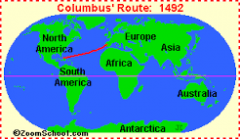
|
|
|
Vasco da Gama |
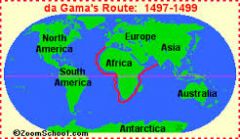
|
|
|
Ferdinand Magellan |
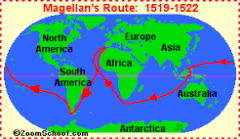
|
|
|
John Cabot |
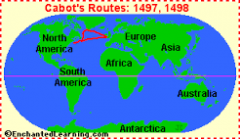
|
|
|
Isolationism |
-To keep everyone else out |
|
|
Plantation Colonies |
-A large farm that is worked by slaves ~European Countries: >Portugal >Spain >England (South) -Grew cash crops |
|
|
Trading-Post Empires |
-A place where you trade goods with others -European Countries: >France -France traded furs with the natives |
|
|
Settler Colonies |
-a permanent place to live -European Countries: >England (North) Example: Jamestown |
|
|
Indentured Servants |
-A person who worked off a debt (owed money) or a prisoner sentenced to the colonies -Like a slave but after they worked off their debt they were set free |
|
|
England Colonies in America |
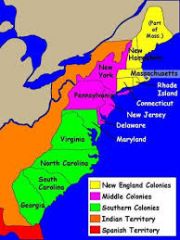
|
|
|
French Colonies in America |
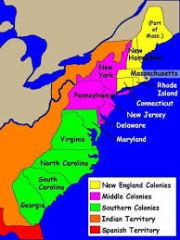
|
|
|
French Revolution |
-Revolution fought in France -Social class war (3 estates were fighting) -King Louis XVI was the king when it started |
|
|
First Estate |
-Church made up this estate (Catholic) -Did not pay taxes -Made up the smallest percentage of people |
|
|
Second Estate |
-Nobles made up this estate -Did not pay taxes -Charges the 3rd estate to use roads on their lands |
|
|
Third Estate |
-Everyone else made up this estate (peasants, merchants, doctors, etc.) -paid ALL the taxes |
|
|
King Louis XVI |
-Was king when the French Revolution started -Was a bad king, could not make a decision, fat, and immature -Spent a lot of France's money -Head was cut off during the Reign of Terror |
|
|
Marie Antoinette |
-married King Louis XVI -people of France hated her -Spent a lot of France's money on dresses, jewelry, plays, etc. -Head was cut off during the Reign of Terror |
|
|
Estates-General |
-A meeting held in France between King Louis XVI and the 3 estates to try to find more money for France |
|
|
National Assembly |
-Created by the third estate in France after the Estates-General was held -Start of representative government in France (limited gov.) -type of government in France during the revolution |
|
|
Tennis Court Oath |
-written by the National Assembly -written by the third estate -written on King Louis XVI's tennis court and was basically a constitution for the new gov. |
|
|
Storming of the Bastille |
-Bastille held a lot of weapons in France and was a hated prison -People took over it to get weapons to fight against 1st and 2nd estates -This was the start of the revolution |
|
|
Maximilien Robespierre |
-leader of France during the Reign of Terror -head was chopped off when it looked like he wanted more power |
|
|
Reign of Terror |
-a time period during the French Revolution where a lot of people were killed by the guillotine -ended when Maximilien Robespierre was killed -Louis XVI and Marie Antoinette were both killed during this time |
|
|
Napoleon Bonaparte |
-ended the French Rev. -Caused the Napoleonic Wars where he tried to take over Europe and make everyone French -Created Nationalism -Was exiled twice |
|
|
Industrial Revolution |
-started in England b/c they had raw materials and people who knew how to run a business -created factories to make goods faster and create jobs -people moved from the rural (country) to the urban (cities) |
|
|
Fly Shuttle |
-this is one of the first invention during the Industrial Revolution -helped textiles (cloth making) by using ropes and pulleys in a loom to make weaving faster |
|
|
Spinning Jenny |
-this was the 2nd invention during the Industrial Revolution and replaced the Flying Shuttle -allowed one spinner to spin eight threads at one time (it helped to produce a lot of yarn) |
|
|
Cotton Gin |
-invented by Eli Whitney during the Industrial Revolution -increased cotton production by pulling the fiber from the cotton and separates the seeds from the lint. |
|
|
Steam Engine |
-was invented by James Watts during the Industrial Revolution -made traveling faster -boats, trains, etc. |
|
|
Interchangeable Parts |
-invented during the Industrial Revolution for machines -you can replace ONE part of a machine that is broken rather than the whole machine (replace the breaks instead of the whole car) |
|
|
Mass Production |
-produce a whole bunch of goods at one time -prices go down because there is so much of one thing |
|
|
Peninsular |
-People who were born in the mother country/Europe that moved to Latin America |
|
|
Creoles |
-People who were born in Latin America, but they were related to people that were born in the mother country/Europe |
|
|
Mestizos |
-are a group of people in Latin America that are a mixture of European and Native American ~Mestizos -M=mixture -E=European -I=Indians |
|
|
Mulattos |
-are a group of people in Latin America that are a mixture of European and African ~Mulattos -M=mixture -A=Africans |
|
|
Haiti's Revolution |
-Haiti was colonized by France -Slave revolt -led by Toussaint L'Overture -Only successful slave revolt |
|
|
Toussaint L'Overture |
-led Haiti's slave revolt -freed all of Haiti's slaves -France captured them and sent him back to France where he died in prison |
|
|
Simon Bolivar |
-led independence movements all over South America -joined forces with Jose de San Martin -wanted to unite all of the Spanish-speaking countries ~Simon Bolivar -S=successful -B=boss |
|
|
Jose de San Martin |
-freed Chile in South America -joined forces with Bolivar |
|
|
Mexico's Revolution |
-led by Miguel Hidalgo -took many different times for them to be successful |
|
|
Father Miguel Hidalgo |
-led Mexico's Revolution -was a Catholic priest ~Father Miguel Hidalgo F=failed M=Mexico/murder H=headshot |
|
|
Imperialism |
-when another country takes over someone else's for their natural resources -Industrial Revolution caused countries to start this |
|
|
Jewel of the Crown |
-this is what India was often referred to as by England because of all their raw materials |
|
|
The White Man's Burden |
-anthem for imperialism -stated that it was the Western power's job to take their culture to other nations |
|
|
Zulu War |
-Africans vs. England -took place in South Africa -Zulu tribe did not want England in their land -England won because they had better weapons |
|
|
Sepoy Rebellion |
-India vs. England -started b/c there was a rumor that England greased their guns with pork fat which was against their religion -England won |
|
|
Sepoys |
-were Indian soldiers that worked for England to make sure that the British rules/laws were being followed |
|
|
Opium Wars |
-China vs. England -England wanted to trade with China, but China didn't want to trade -England found the drug opium that would trade, and China wanted it ogne -England won |
|
|
Taiping Rebellion |
-China vs. China -Chinese people wanted everyone to live equally -Wanted to get rid of poverty |
|
|
The Boxer Rebellion |
-China vs. everyone -China wanted anything not "Chinese" out of China -China lost |
|
|
Open Door Policy |
-Was a document that was created by the US that stated China HAD to trade with everyone |
|
|
Spheres of Influence |
-took place when European countries and the US went in to China and took over a certain area of land for them to control the economy (for trade) |
|
|
Spanish-American War |
-US vs. Spain -Fought over Cuba's independence from Spain -Started over the ship US Maine blowing up -US wins -caused the US to start imperializing(gained the Philippines, Guam, etc.) |
|
|
The Monroe Doctrine |
-Stated the American were off limits to further European colonization -Created by President James Monroe |
|
|
USS Maine |
-was an American ship that was sent to Havana Harbor -the ship blew up and caused the Spanish-American War |
|
|
Yellow Journalism |
-this is where newspapers compete with each other to see who can get the juiciest headline |
|
|
Roosevelt Corollary |
-this was added to the Monroe Doctrine -it stated that the United States was an international police power |
|
|
Matthew Perry |
-this man was from the United States that carried out the threat that if Japan did not industrialize, they would be imperialized. |
|
|
Meiji Restoration |
-this was the time period in Japan where Japan industrialized |
|
|
Sino-Japanese War |
-Japan vs China -Japan wanted to trade with Korea -China and Japan both agreed not to sent troops into Korea, but China did -Japan won |
|
|
Russo-Japanese War |
-Russia vs Japan -fought over the rights to Manchuria, but Japan said they would leave it alone if they keep Korea. Russia said no -Japan won and became a world power |
|
|
Congress of Vienna |
-took place after the Napoleonic Wars -this is where the Great Powers gave all of the land that Napoleon took over back to whoever originally owned it. |
|
|
Napoleonic Wars |
-took place all over Europe -leader was Napoleon Bonaparte -Napoleon took over many different European countries and tried to make them French (caused Nationalism) |
|
|
Otto Von Bismarck |
-unified Germany -ruled under the policy called "realpolitik" -believed in blood and iron |
|
|
Camillo di Cavour |
-unified Northern Italy -REMEMBER: ABCDEFGHIJKL... **C comes before G so Camillo did the North and Garibaldi dids the South |
|
|
Giuseppe Garibaldi |
-unified Southern Italy-REMEMBER: ABCDEFGHIJKL... **C comes before G so Camillo did the North and Garibaldi dids the South
|
|
|
Louis-Napoleon |
-was Bonaparte's nephew -first President of France -crowned himself Emperor Napoleon III -Industrialized France |
|
|
Nationalism |
-this term is the belief that one's greatest loyalty is to a shared culture (Includes common history, language, religion, and nationality) -everyone in France should speak French |
|
|
Berlin Conference |
-European nations divided Africa among themselves |
|
|
World War I |
-1914-1918 -also known as the Great War -took place after Archduke Franz Ferdinand was killed -MAIN were the 4 main causes -had 2 key alliances: Central and Allied Powers |
|
|
Militarism |
-countries competing against one another to have a bigger and stronger military -Example: Germany was competing with England to build battleships. |
|
|
Central Powers |
- the military alliance in WWII - between Germany, Italy, and Austria-Hungary |
|
|
Allied Powers |
- the military alliance in WWI -between United States (eventually), England, France and Russia |
|
|
Archduke Franz Ferdinand |
- was the heir to the Austro-Hungarian Empire -shot and killed by Serbian Nationalist -his death started WWI |
|
|
Russian Revolution |
-took place in Russia during WWI -people were not happy about the taxes, working conditions, etc. -blamed Czar Nicholas II so they killed him and his family. |
|
|
Czar NIcholas II |
-was the ruler of Russia during WWI -people blamed him and his family on the problems in Russia and killed them |
|
|
Vladimir Lenin |
- took over Russia's throne after the Russian Revolution -was the first communist leader of Russia |
|
|
U-boats |
-German submarines during WWI |
|
|
Lusitania |
-was a British passenger ship during WWI that was sunk because of a German U-boat. -made the US very mad, but did not bring them into WWI |
|
|
Zimmerman Note |
-a letter written to Mexico from Germany during WWI -was written asking for an alliance between Germany and Mexico against the US -stated if Mexico would fight with Germany, they would get land back from the US |
|
|
Fourteen Points |
-was created by President Woodrow Wilson -stated his ideas on how to prevent another world war from happening |
|
|
War Guilt Clause |
-part of the Treaty of Versailles -written to punish Germany for all of the damages of WWI |
|
|
League of Nations |
-created by President Woodrow Wilson -created to solve problems between nations to prevent another world war -didn't work b/c many countries were not part of it, ad not military, and had to agree on everything |
|
|
Fascism |
-a political movement that stressed and extreme form of nationalism and power to the state -people did not have right -example: Nazis |
|
|
Benito Mussolini |
-leader of the Fascist Party in Italy -nicknamed "II Duce" |
|
|
Adolf Hitler |
-leader of the Fascist party in Germany -author of Mein Kampf -believed that "true" Germans had blonde hair and blue eyes |
|
|
Joseph Stalin |
-was the leader of the Soviet Union -Communist Leader during WWII |
|
|
World War II |
-1939-1945 -caused when Hitler invaded Poland -2 main alliances were Allied and Axis Powers |
|
|
Axis Powers |
- Military alliance during WWII -between Japan, German, and Italy |
|
|
Allied Powers |
- military alliance during WWII -between England, France, Soviet Union, and eventually the United States |
|
|
Battle of Britain |
-Battle during WWII -England vs. Germany -Germany dropped air bombs on England repeatedly -Winston Churchill refused to surrender |
|
|
Winston Churchill |
-leader of England during WWII |
|
|
Lend-Lase Act |
-passed by Franklin Roosevelt stating that the US would lend/lease weapons and other supplies to countries that were important to the US |
|
|
Pearl Harbor |
-after Japan bombed this, the US entered into WWII -Japan bombed this place after we placed an oil embargo on them |
|
|
Battle of Midway |
-Battle during WWII -took place in the Pacific -US vs Japan -turning point in the war after the US destroyed Japanese planes and air craft carriers |
|
|
Island Hopping |
-The US flew over islands and soldiers jumped out of the planes an took over the islands by jumping from island to island. -took place during WWII |
|
|
Battle of Stalingrad |
-Soviet Union vs Germany -Hitler tried to invade the Soviet Union again -Soviet Union won -Battle during WWII |
|
|
The Invasion of Normandy |
-often call D-Day -Allies vs Germany -freed France who had been taken over by Germany -Battle during WWII |
|
|
Battle of the Bulge |
-Allied vs. Germany -often called Hitler's last stand. -Allied forces took over Germany -Battle during WWII -lead to VE Day |
|
|
VE Day |
-Victory in Europe |
|
|
VJ Day |
-Victory in Japan -took place after Harry Truman dropped 2 atomic bombs on Japan |
|
|
Great Depression |
-took place worldwide after WWI -started in Europe but spread all over the world due to a lack of jobs, etc |
|
|
margin |
-buying things on credit |
|
|
Black Tuesday |
-the day that the US experienced the biggest loss in money value in the stock market |
|
|
calling the loan |
-took place during the Great Depression -banks demanded all of the money all of the money they loaned people all at once |
|
|
New Deal |
-created by Franklin D. Roosevelt to help get the United States out of the depression -created programs to try to get employment raised. |
|
|
Protectionist Policies |
-was created by England during the Great Depression -policies that are designed to protect the domestic industries and services from foreign competition (England only bought goods from England) |
|
|
Truman Doctrine |
-created by Harry Truman after WWII -was created to stop the spread of communism by giving money to the East side of Europe |
|
|
Mao Zedong |
-leader of Communist China ***Mao=Mayo=BAD |
|
|
Chiang Kai-Shek |
-leader of Nationalist China ***Shek=Shrek=GOOD |
|
|
Korean War |
-North Korea = communist -South Korea = noncommunist -divided at the 38th parallel -North Korea invaded South Korea -Result was a cease-fire and Korea is still divided today |
|
|
Vietnam War |
-North Vietnam = communist -South Vietnam = noncommunist -divided at the 17th parallel -North Vietnam invaded South Vietnam -North Vietnam won the war against both US and South Vietnam and still communist today |
|
|
Domino Theory |
-The theory that if one nations falls to communism that all nations would fall to communism |
|
|
Ho Chi Minh |
-leader of North VIetnam **Ho Chi = Hoochie = BAD |
|
|
Ngo Dinh Diem |
-leader of South Vietnam -Diem = Denim = Jeans = GOOD |
|
|
Vietcong |
-people that lived in South Vietnam that wanted to be communist -fought against South Vietnam and the US during the war |
|
|
Cuban Missile Crisis |
-US found Soviet Union missiles being put together in Cuba -closest event that almost turned into a nuclear war -Kennedy ended it by placing a naval blockade |
|
|
Fidel Castro |
-Communist leader of Cuba |
|
|
Sputnik |
-was the first satellite launched into space during the Cold War by the Soviet Union |
|
|
Mohandas Ghandi |
-leader of the independence movement in India -nonviolent -was killed because it looked like he switched sides -organized the Salt March |
|
|
Salt March |
-created by Ghandi -Boycott against Salt from England -Made their own salt by going down to the ocean |
|
|
India |
-Hindus were given this land after it was divided between the Hindus and the Muslims -known as the "Jewel of the Crown" -colonized by England |
|
|
Pakistan |
-Muslims were given this land after it was divided between the Hindus and Muslims |
|
|
Jomo Kenyatta |
-Was the main nationalist leader in Kenya -Became the leader of Kenya after they received their independence from Kenya |
|
|
Mau Mau |
-Kenyans who used guerilla warfare tactics to fight the British settlers |
|
|
Eastern Europe after WWII |
-had a communist form of government after WWII ~East is the least, West is the best |
|
|
Western Europe after WWII |
-Did not have a communism form of government after WWII -East is the least, West is the best |
|
|
Socialism |
-An economic system ($$) where the government collects everyone's money and divides equally among everyone (everyone gets the same amount of money) |
|
|
Solidarity |
-a labor union in Poland that went against communist rule -leader was Lech Walesa |
|
|
Lech Walesa |
-the leader of the labor union in Poland called Solidarity -Elected president of Poland |
|
|
Mikhail Gorbachev |
-was the first leader to be the elected president of the USSR -worked with Reagan with the US -Wanted to change a lot of the economic policies and social (Glasnost, Perestroika, Democratization) -Work started to end communism |
|
|
Perestroika |
-policy created by Gorbachev -was an economic policies that would allowed for more decision-making and private ownership of businesses |
|
|
Glasnost |
-policy created by Gorbachev ~social changes -more public participation -greater individual rights |
|
|
Hungary after WWII |
-West was not communist -East was communist -people cut a hole through the fence to get the West side |
|
|
Boris Yeltsin |
-was the first directly elected president of the Russian Federation in 1991 -created Shock Therapy |
|
|
Shock Therapy |
-created by Boris Yeltsin -Changed the economic system ($$) from socialism to capitalism -did not work |
|
|
Satellite Nations |
-countries that fell to communism under the soviet union's control -these countries revolved around the Soviet Union |
|
|
Commonwealth of Independent States (CIS) |
-Created when 15 Soviet republics declared independence after they tried to overthrow Gorbachev -this was the official end of the Soviet Union |
|
|
European Economic Community (EEC) |
-designed to create a common market by eliminating trade barriers and establishing more trade opportunities -Main idea is to create a single market within member states that would get rid off tariffs (taxes) -replaced by the European Union (EU) |
|
|
European Union (EU) |
-replaced the EEC -created a single monetary unit (everyone had the same money) -created the Euro |
|
|
Vladimir Putin |
-Became the Russian president in 1999 and is still there today |
|
|
Universal Declaration of Human Rights |
-set human rights for all nations, listing specific rights that every human should have |
|
|
Apartheid System |
-took place in South Africa -was the legal segregation of whites and blacks ~Apartheid = Apart |
|
|
F.W. DeKlerk |
-elected president of South Africa -released Nelson Mandela from prison -made the ANC legal |
|
|
Nelson Mandela |
-was the first universal (everyone was allowed to vote) elected president of South Africa -was the leader of the ANC and put in jail -ended Apartheid |
|
|
African National Congress |
-also known as the ANC -went against the Apartheid system in South Africa |
|
|
Harry Truman |
-President of the United States towards the end of the WWII -ended WWII in the Pacific by dropping two atomic bombs |
|
|
The Marshall Plan |
-was created after WWII to give money to Western Europe to stop the spread of communism in Western Europe M = W |
|
|
United Nations |
-replaced the League of Nations -goal was to prevent another world war -had a military to enforce their rulings -US was part of this |
|
|
North Atlantic Treaty Organization |
-referred to as NATO -military alliance between Western Europe, Canada, and United States -against Soviet Union |
|
|
Warsaw Pact |
-created by the Soviet Union -military alliance between Soviet Union and Eastern Europe |
|
|
Anti-Semitism |
-term means against Jews |
|
|
Aryan Race |
-this was the "master race" according it Hitler -blonde hair, blue eyes |
|
|
Nuremburg Laws |
-laws passed in Germany against the Jews -stated that Jews had to marry other Jews, had to wear the Star of David, and they were not citizens of Germany |
|
|
Krsitallnacht |
-Night of Broken Glass -Nazis destroyed Jewish homes, properties, businesses, and synagogues |
|
|
The "Final Solution" |
-this was Hitler's last stage to get rid of all Jews, and other cultures -where he put them in concentration camps |
|
|
Nuremberg Trials |
-where Nazis leaders were placed on trail for "crime against humanity" for the part they played in the Holocaust |
|
|
Zionist Movement |
-when the Jews were returning to Palestine and calling for a Jewish nation-state |
|
|
Israel |
-became the Jewish Homeland -orginally this was Palestine |
|
|
The Balfour Declaration |
-England issued it to show their support for a Jewish homeland |
|
|
The Palestinian Liberation Organization |
-also called PLO -Palestinians wanted their own homeland |
|
|
Suez Canal |
-located between Africa and Asia -used as a shortcut to Asia |
|
|
Camp David Accords |
-first peace treaty with Israel and Egypt -Egypt recognized that Israel was a country |
|
|
Oslo Peace Accords |
-helped make peace better between Israel and other nations -gave Palestinian self rule |
|
|
Cold War |
-A conflict between the US and Soviet Union -afraid of a nuclear war (World War II) -Space Race, Arms Race, Cuban Missile Crisis, Korean War, Vietnam War, etc. -Took place during this time |
|
|
Berlin Wall |
-separated East Berlin and West Berlin so that people could not leave the East side -called the Iron Curtain -after the wall fell it was a symbol of communism |

